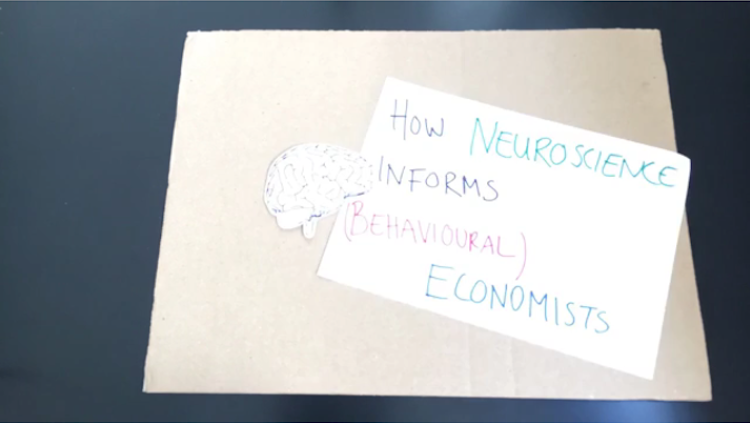Will America Be a Land Where Only the Rich Get PhDs?
- Published20 Nov 2017
- Author Dwayne Godwin
- Source BrainFacts/SfN

“In this world nothing can be said to be certain, except death and taxes.”–Benjamin Franklin
This could be the month when American science takes a body blow. The cause for this turn is mundane, but no less stunning: tax reform. It’s only a few lines of code in a complex tax bill–but as any programmer can tell you, the wrong code in the wrong place can cause a lot of trouble.
Two bills are under consideration by congress that could slow the pace of scientific research if signed into law. The first of these emerged from the House of Representatives and is called the Tax Reform and Jobs Act. Among many provisions to change tax laws, the act repeals the tuition deduction for graduate students who are seeking higher graduate degrees (a Senate version does not have this provision, but a process called reconciliation could merge the two).
In essence, the House plan could be a new and unfair tax on students seeking advanced research training. Should we panic? Probably not – but a rational assessment and engagement is warranted.
PhD students are uniquely affected by this proposed legislation. In most American universities, including my own, PhD graduate students are provided a stipend and tuition assistance in the form of a tuition scholarship upon enrollment. This scholarship operates similar to a tuition waiver, meaning that no money changes hands and PhD students are able to attend classes essentially for free. This is justifiable because PhD students are mainly being trained to do research, and are working in university laboratories contributing to projects or performing service as teaching assistants. They contribute to the integrity of our universities and the research engine of our country.
Student stipends are low enough that a student’s overall tax burden is usually no more than a few thousand dollars under current law. The proposed legislation would remove this deduction, and would assess the tuition waiver as if it had the equivalent value in real income to the student. The result is estimated to increase the tax burden of a student from around $2,000 to $10,000 or more (depending on income and remaining deductions). It’s basically a tax on money that doesn’t exist.
This could be a mistake with significant negative consequences for these students and the universities they attend. Because the tax is on the perceived value of the tuition waiver, no money is actually transferred to students with which they could meet this additional tax burden (thus there’s no immediate “value” of this tuition waiver – such value is only realized many years after it is granted, when the students enter the job market). If enacted, and if students were forced to pay it from their stipend, the legislation could reduce a PhD student’s salary to near or below the federal poverty level, now at $12,060 for an individual and $16,240 for a couple.
Should we require our best and brightest to literally live in poverty, or to take on significant debt at the most vulnerable period of their careers? Should students who are contributing to our community and society by working on things like cures for Alzheimer’s disease or cancer, or other innovations that represent American excellence in science and technology, also face a crippling tax burden so that more affluent individuals and companies may benefit from the small amount of revenue this plan would produce? If the current tax reform bill had been law when I was in graduate school, I wouldn’t have had the means to earn my doctorate. If it is signed into law now, there are many students from diverse and economically challenged backgrounds who will never choose STEM careers because the personal price will be too high.
This chilling effect unveils a more subtle but no less important consequence of this legislation on the standing of American science. The vibrancy of American universities depends on the constant influx of new ideas and energy provided by students from all walks of life. It is part of what keeps universities anchored in the real world and has historically been responsible for the elevation of graduate education as an enduring world model. This legislation poses two existential risks to American higher education: (1) We could suffer a brain drain as our best students could opt to obtain their education abroad, where the economic toll may be much less; (2) We’ll risk exacerbating a system of haves and have nots, as small universities with lesser endowments will struggle to compete with universities with much larger endowments for recruitment of gifted students. I believe there’s a high risk that this could play out nationally, as federal funding for research shifts from poorly resourced states to richer ones–meaning that research on treatments and cures for diseases could be concentrated in a few, well resourced academic centers. Because we can’t predict where the next great idea may arise, this winnowing risks losing or greatly curtailing outstanding research programs at smaller universities.
There’s nothing intrinsically wrong with tax reform, but it’s important to go beneath the surface to examine the impact of these bills so that unintended harms can be eliminated. It’s also important, whatever your political persuasion, to exercise your power as a citizen to help inform your representatives of the impact of these provisions in the House bill, and to communicate your will as a constituent. Taxes can be complex, and it’s worth being sure that your representatives don’t dislodge a boulder by moving a pebble. It’s important to note that while the House bill affects true tuition waivers (where the waiver is contingent on service), fellowships (which do not entail this contingency) may be exempt because important provisions of current law have not been touched—so far.
What you can do: The two versions of tax reform will undergo a process of reconciliation in the coming weeks. Now is the time to make your voice heard. In addition to your own members of Congress, consider contacting the members of the Senate finance committee who will be involved reconciling the Senate and House bills:
Georgia – Senator Isakson - (770) 661-0999
Idaho - Senator Crapo - (208) 334-1776
Iowa - Senator Grassley - (515) 288-1145
Kansas - Senator Roberts - (913) 451-9343
Louisiana - Senator Cassidy - (225) 929-7711
Nevada - Senator Heller - (702) 388-6605
North Carolina - Senator Burr - (800) 685-8916
Ohio - Senator Portman - (614) 469-6774
Pennsylvania - Senator Toomey - (717) 782-3951
South Carolina - Senator Scott - (803) 771-6112
South Dakota - Senator Thune - (605) 334-9596
Texas - Senator Cornyn - (512) 469-6034
Utah - Senator Hatch - (801) 524-4380
Wyoming - Senator Enzi - (307) 772-2477
Now, I’m not suggesting that you call and rant at your Senator—in fact, just the opposite. However, by respectfully sharing your story you can be heard as you show the personal stake you have in this legislation. Even If you’re not a graduate student, I’d suggest that you still have a stake in this legislation. The research performed by these talented students is vital to the pace of discovery and innovation. If the U.S. becomes a country where only the rich obtain graduate degrees, the cost of this opportunity redistribution will be enormous and long lasting.
[Note: Dr. Godwin is Dean of the Graduate School at Wake Forest University. His views should not be taken as representative of Wake Forest University or of Wake Forest Baptist Health.]
CONTENT PROVIDED BY
BrainFacts/SfN
Also In Law, Economics & Ethics
Trending
Popular articles on BrainFacts.org


















